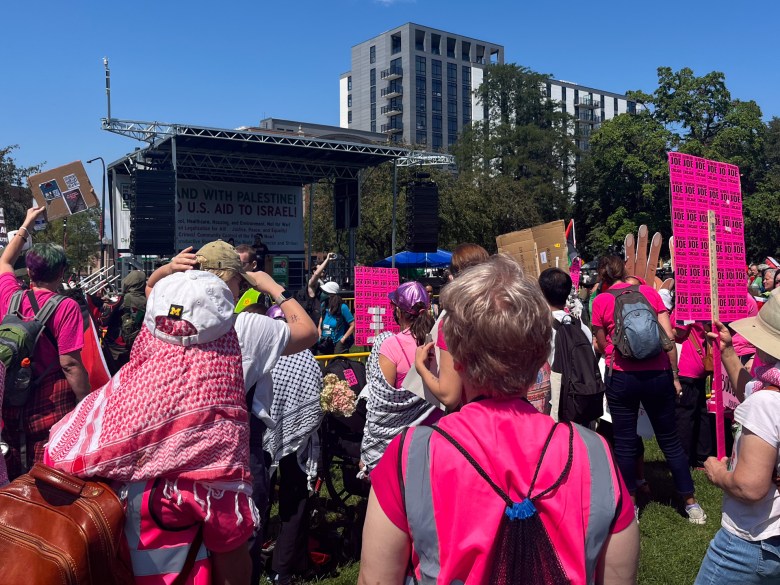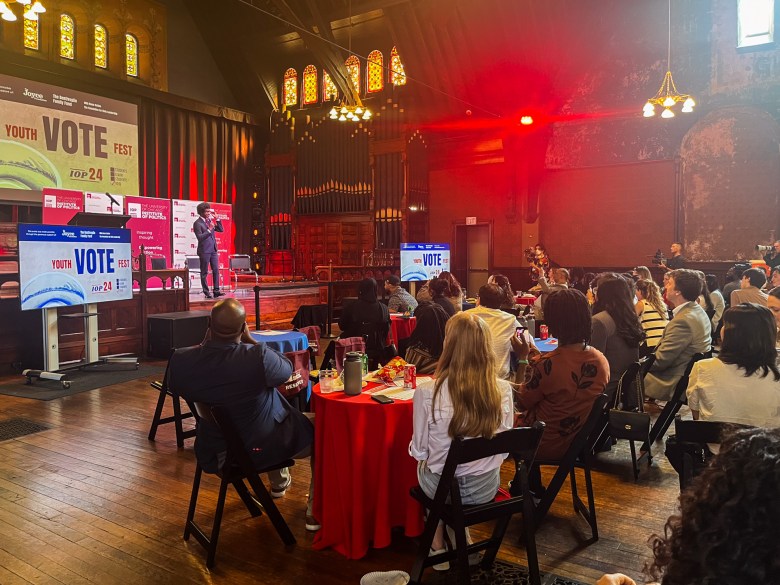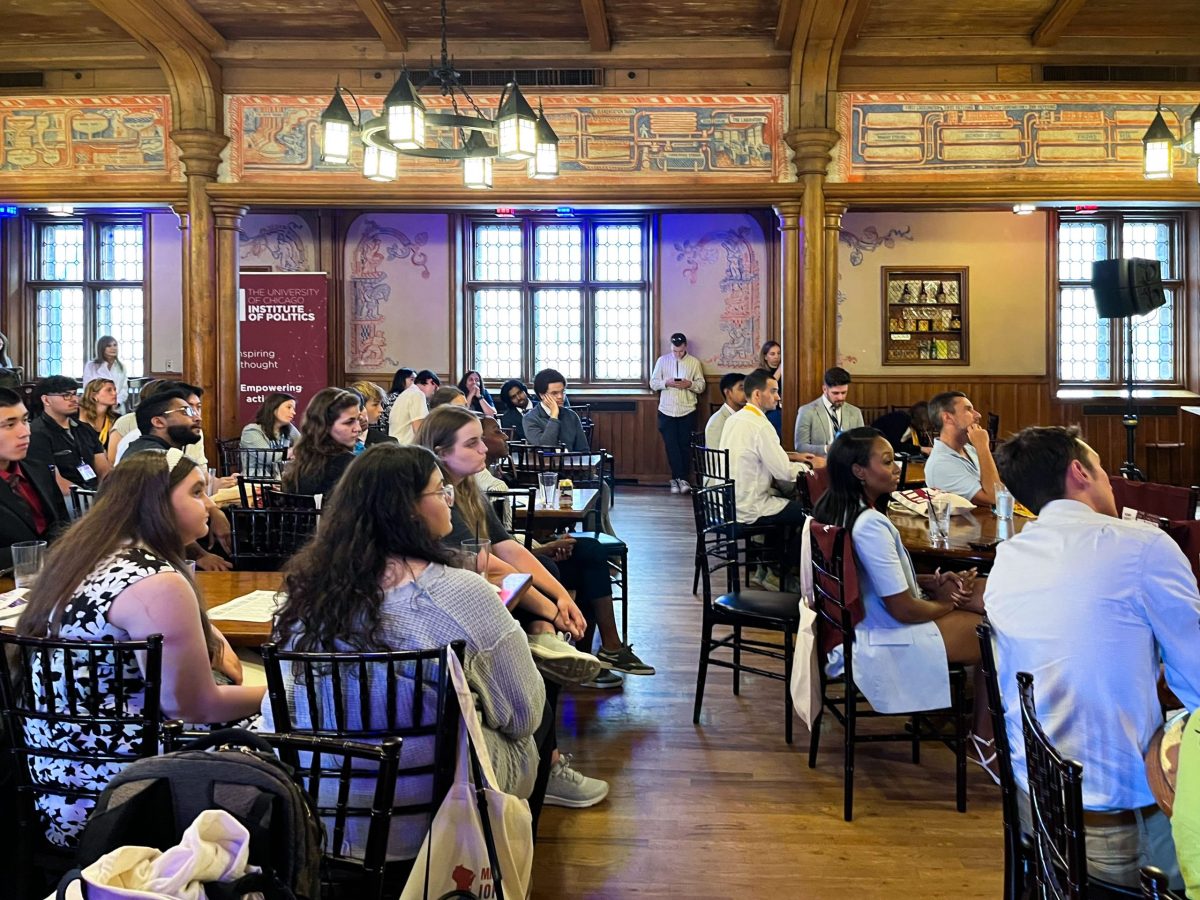CHICAGO — At this week’s Democratic National Convention, I spoke to left-leaning students about their biggest concerns with higher education: high tuition costs and access. The conversations were a departure from what young conservatives told me was their top issue at last month’s Republican National Convention: free speech.
That said, amid nationwide crackdowns on campus protest, some of the young Democrats I spoke with shared sentiments similar to their Republican counterparts. They said they were worried about preserving academic freedom and a space for mutual understanding and respect on campuses nationwide.
I asked both groups of students whether they believe education institutions nationwide are fulfilling their purpose in society, and about the role of diversity in college curriculum. While conservative students told me DEI initiatives blocked equal opportunity in the classroom and the workforce, liberal ones emphasized opportunity gaps in marginalized communities.
What follows are some of my questions and their replies. Interviews have been edited for clarity.
Related: Interested in innovations in the field of higher education? Subscribe to our free biweekly Higher Education newsletter.

How did you first get into politics?
“My family owns a small farm in Iowa, that’s where my grandparents are from. My family have been Democrats since the New Deal and since Roosevelt brought electricity and plumbing to my great grandparents’ home … As part of that, it’s our job to make sure those same policies and politics of caring for other people is brought to the 21st century.” — Michael Clausen, a rising senior at Loyola University Chicago
“I have voted for the Democratic Party in general. I voted for Joe Biden in 2020, and I voted for Democrats in the midterms. But I vote for them because I dislike the Republicans more, is really how I feel about it. Especially being in Ohio, the policies the Republicans are pushing. My access to HRTs [hormone replacement therapies] has been under threat multiple times last year, so I mostly vote for the Democrats to kick out the Republicans.” — Sean Bridge, a rising senior at the University of Cincinnati
When deciding which college to attend, what were your criteria? Did your political beliefs play a role?
“The main reason I chose Florida is because of Bright Futures, a program where if you make over a certain SAT score and have a certain GPA, you get a completely free, full ride to any [in-state] public university. Unfortunately, I couldn’t afford the private schools I got into out of state. I wanted to get out of Florida, but the tuition out of state is astronomical and the financial aid is nonexistent.” — Morgan Vanderlaan, a sophomore at the University of Florida in Gainesville
“The reason I didn’t end up applying to Notre Dame or Vanderbilt was because I saw the majority of their students were conservative. I grew up in a high school that was mostly conservative, and I’d have enough of that. I didn’t want to go into a place where I wouldn’t find people like myself.” — Alyssa Manthi, a rising junior at the University of Chicago
What is the purpose of an American higher education? Are institutions achieving that purpose right now?
“Our purpose as people in higher education is to teach people what we learn and pass that down to the general public … because not everyone can afford to go to higher education … But the education field is not really geared for you to say ‘Hey, I learned a lot, now it’s time to teach my community.’ That’s not really what they’re pushing for. They’re pushing for ‘Hey, you learned all this information, now it’s time to get a job. Now it’s time to get some money.’” — Arnold Brown, a third-year student at DePaul University’s College of Law in Chicago
“The pursuit of knowledge is always the purpose of higher education, but there’s also trying to diversify the elite of a society and make leaders that are more responsive to everybody. We have to look beyond institutions in the Ivies or in the top elites because that’s only really about 6 percent or less of the student population. There are people from state schools, from schools in the South and places you’re not really looking that have people with skills. If you’re trying to diversify the elite and trying to make the leading spaces of America look like America, you can’t go to the same 20 schools.” — Sandra Ukah, a sophomore at the University of Florida in Gainesville
“College is so important to learn how to be civically engaged, and I think a lot of colleges need to have a greater focus on this. What you don’t want happening is for people in the elite to go to these colleges and use those resources just to contribute to their own personal wealth and gain.” — Meghana Halbe, a rising junior at the University of Chicago

Where is your college failing?
“For many students, college has become unaffordable. More and more students are working two, three jobs in order to put themselves through college and taking on tons of debt. I know so many people at my own university who had to drop out because of the financial burden that university was putting on them, and I go to a public school in Ohio.” — Sean Bridge
“The cost is such a huge factor, but it goes beyond cost. It’s more of an issue of access … [College admissions] are so competitive, you can’t just have good grades, you can’t just have good test scores. You need a fantastic essay and a fantastic list of extracurriculars. It makes it so hard for people who grow up in disadvantaged communities where they don’t have access to the same sorts of extracurriculars, after-school programs, the same sorts of pre-college support that are found in richer communities.” — Michael Clausen
view from the RNC
“In Georgia, our biggest issue is that we don’t get enough funding to our public HBCUs. They have been historically underfunded. I’ve been to these campuses and they need every bit of that funding. You can’t teach kids in a run down classroom … If students can’t get better education facilities, how can we expect them to get a higher education?” — Blake Robinson, Georgia Southern University in Statesboro, Class of 2024
“At my school I feel like we often only care about outward appearances. Fordham overaccepts students, but there are so many students that are pushed out of housing, or forced to live in quads or we don’t have space for. We just re-did a cafeteria … while my campus at the Lincoln Center has problems with air conditioning, we’ve had mold and the answer is ‘We’re so sorry, we can’t fix that for you.’” — Sigalit Shure, a rising junior at Fordham University
“The protest for the ceasefire in Gaza. UChicago believes in the freedom of speech so they definitely gave some room to protest, but they shut it down because of institutional neutrality, which I definitely want to question in some ways. UChicago continues to face issues with what they mean by freedom of speech and how that can look on college campuses.” — Meghana Halbe
What is the value of being exposed to a diverse set of curriculum?
“[After college] people are going to encounter so many different communities, different perspectives and different experiences, and they need to be prepared for that. The people trying to ban diversity, ban women’s and gender studies, they’re trying to say that those things don’t matter and our movements don’t matter but they do. They are a representation of our history. We’re not going to let them be taken away.” — Victoria Hinckley, a University of South Florida Tampa student who said she doesn’t identify with either party and was expelled this spring for her involvement in the encampment protests
“A lot of the times the classes I’m taking are being taught through rose-colored glasses because they’re just not teaching anything beyond the sphere of America … and they’re only teaching the good things in America and not the bad things. And if history is not taught in its complete state, then it will be repeated. If we do not fix the issue right now, it’s going to get out of control and a degree from Florida or the South will not be on par with institutions that value DEI and DEI practices.” — Morgan Vanderlaan
“In a peak higher education environment, you want the free exchange of ideas, that’s what a college is supposed to be about. With diversity in a college, you have that. I have been in spaces where the higher education atmosphere is not diverse, and in ones where it is so diverse it’s insane to me. In those diverse areas, I feel more educated.” — Blake Robinson
Can you have productive conversations with people who have different beliefs on your campus? Have your experiences in college challenged your own beliefs?
“The greatest challenges to my beliefs have been as a result of the club I started, it’s a bipartisan club where we meet with conservatives on campus who are a minority. … Ultimately it’s all about trying to understand what other people think, why they think what they think. Most people are rational. If you try to understand them and leverage their views you can always have a bit more productive conversation.” — Angel Mosqueda, a rising senior at Elmhurst University in Chicago
“There are a couple of outspoken conservatives on campus, I haven’t had the best conversations with them. I think a lot of the time there’s a breakdown in what we believe to be fact because we use very different sources and sometimes they misconstrue data.” — Emilie Tueting, a rising junior at Northwestern University in Evanston, Illinois
“I’ve actually been able to have a lot of productive conversations … I was able to interact with [conservatives] on a person to person level, that did a good job of taking me out of the very reactionary and polarized identity I’d come to have. With social media, it’s very easy to get siloed into one group.” — Alyssa Manthi
“[I was challenged] on the issue of the genocide happening in Gaza. At first I was very wary to label it as anything. Just from my background, growing up in Jewish youth group, there’s an agenda that’s being pushed on you. … When I finally started talking to people outside of my bubble, who had different perspectives, I realized so much of what I grew up with is propaganda. It opened up my eyes to this new world.” — Sigalit Shure
“Personally, I have been challenged, but I’m very firm in what I believe. As a minority, as a Black man, I know what I want for the future of the country and I know the policies I personally would like to push. I’ve had conversations with Republicans pretty much opposite of me. With what they’re saying, it’s really important to listen and understand where other people are coming from, but my personal standpoint is not really going to change because of my background, who I represent and who I want to represent.” — Arnold Brown
This story about the Democratic National Convention was produced by The Hechinger Report, a nonprofit, independent news organization focused on inequality and innovation in education. Sign up for our higher education newsletter. Listen to our higher education podcast.




